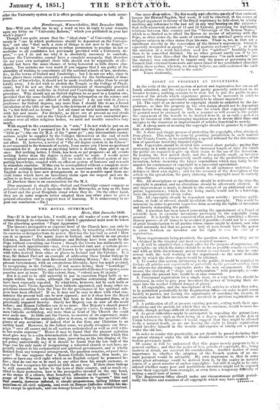THE ROYAL SUPREMACY.
'teas, 25th December 1850.
Sin—If it be not too late, I would, as-an old reader of your able paper, -submit through its columns the view which I apprehend must soon be taken of the absorbing question "Papal Aggnession."
The Queen's prerogative as supreme head of the Church here can only be said to be aggressed or encroached upon, surely, by something which impairs its exercise or derogates from its power. How has the late bull so acted ? How can it so operate ? For many years in Ireland, and latterly in our greater Colonies, Roman Catholic Archbishops and Bishops have been made by the Pope without consulting our Crown ; though the Crown has deliberately re- cognized such appointments—nay, even conceded rank and a certain prece- dence to such Prelates, who are all known to be appointed Bishops of sees, with titles derived from cities or places in Ireland- and the Colonies. It is true, Sir Robert Peel set an example of addressing these 'titular bishops by their stumamessis "the most Reverend Archbishop -Murray,".8sc. ; which the present Government, with an ostentatious liberality, have too much avoided, by recognizing in the Colonies (if not nearei home ) their " Lonlships' " territorial or diocesan titles, and have so far oommitted themselves upon a main question now at issue. To thisoxtent, then, " volenti non fit injuria." But it is said to be *till unlawful to put in execution Papal bulls or re- scripts within this realm, although the penalties restraining that offence have been expressly repealed. By what form, however, but by such bulls or rescripte, have Vicars Apostolic been hitherto appointed, and many other re- gulations emanating 'from the Pope for the governance of his spiritual sub- jects here been effected? If so, it may not be easy to show with what con- sistency the present bull ran be now opposed; nor is it clear how the Royal supremacy in matters ecclesiastical has been in fact derogated from, or is practically inupaired thereby. -Surely her Majesty can do now all she-could before; and Roman Catholics can do no more. Her Majesty's church power is the same, although she may not be able propsio vigore, to unmake a Ro- man Catholic archbishop, any more than as head of the Church she could ever snake one. As little 'can the Crown, in exercise of its supremacy, make or unmake-a Wesleyan minister, elder or deacon or claim the spiritual idle- glance of .any sectarian; if indeed that is due from any Christian to an earthly head. However, in the fullest sense, we gladly recognize our Sove- reign "over all causes and in all matters ecclesiastical as well as civil with- I must give way to a.calm determination of the boundaries within which this supremacy ranges. In the mean time, (provoking as the late-display-of Pa- pal policy undoubtedly is,) if it should be found that the late bull of the Pope was his only mode of reorganizing a tolerated church or sect here, ca- per:laity aobjeet to his ecclesiastical and spiritual government, and is wholly dishnct from any temporal arrangement, the question remains, ad quod dam- slum? No one supposes that a Roman Catholic hierarch, thus made, ac- quires ordoses any civil right which as an English subject he possessed be- fore ; that;he can sue or be sued in any other than his simple surname, or that the law recognizes his spiritual title in any way. If then these bishops be still amenable as before to the laws of their country, and as much en- titled to their protection how is the prerogative invaded on the one hand, Or the status of a citizen, 'thus bemitred, attbcted on the ether? The lan- guage of Dr. Wiseman in stalking of 'his intention -to "govern" this and that *aunty, :however Masted, is simplypreposterous, ;falling lifeless mid pointlesaam all. civil . sulajacts, .and even on Roman. Catholics witbinitis dis- trict except in spirituals, and can damagehimself only by its unreal bombast. One moreitsirtiton. AirLtini manly Mid effeetiaaspoe4' ellthat eminent lawyer sie ugdet, last' week; It will-be observed; ih the course of his legal argument in favouroftheltoyal supremacy he falls short, by wholly oinittino any refeitacel to ;Me last act in aaty valytWarMglont the subject— that well-winnowed statute of 11 duid 12 Victoria, ;providing_ for diplomatic relations between this country and the "'Sovereign of the Roman States," which is so limited as to-afford the Queen no means of adjusting' with-the Pope, as other states do, the mode- of exercising. his 'spiritual power over his religious subjects in other states than himosno. Thew:* too, in that -act a significant novelty in the reservation of the queen's, eopromaq, which is especially designated as simply "over all matters ecclesiastical" ; as if by the omission of a wdrdlierctofore used her "spiritual" heatlehip began then to be somewhat doubted. On no Other ground 'surely can • it be ac- .counted for than this—that the Royal sapremacy 44 in such matters" (see the statute) was considered .to import only the power of governing in her Council that external framework and inner nitual of her established churches within these realms, wherein, we firmly believe, are still enshrined the faith and doctrine "once delivered to the saints." "
Yours obediently,






























 Previous page
Previous page